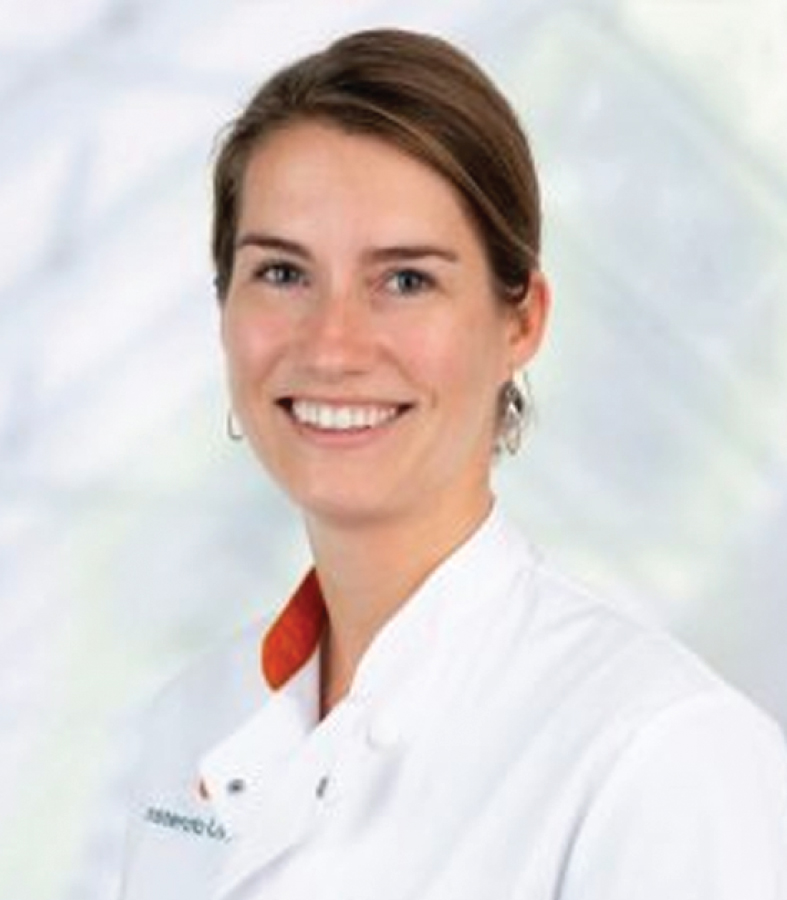Kathrin Brockmann, Milan Zimmermann, and Dareia Roos, Recipients of The Parkinson Prize 2023
The Journal of Parkinson’s Disease is proud to announce the two articles that have won this year’s Parkinson Prize, recognizing these outstanding contributions to the advancement to Parkinson’s disease (PD) research. Recipients of the award are co-authors Kathrin Brockmann, MD, (Center of Neurology at the University of Tübingen, Germany) and Milan Zimmermann, MD (University Hospital of Tuebingen, Germany) for best basic research article, and Dareia S. Roos, MD, (Amsterdam University Medical Center, The Netherlands) for best clinical research article. The winning papers are:
Cerebrospinal Fluid Biomarkers of Inflammation in Parkinson’s Disease, by Zimmermann M, Brockmann K [1].
Prevalence of Prodromal Symptoms of Parkinson’s Disease in the Late Middle-Aged Population, by Roos DS, Klein M, Deeg DJH, Doty RL, Berendse HW [2].
These papers were selected by the Associate Editors of the Journal of Parkinson’s Disease’s from over 220 articles published in the 2022 volume. Awardees will receive a commemorative trophy and a cash award of $1,000 (per article). The Parkinson Prize will continue as an annual award.
“On behalf of the entire editorial board of the Journal of Parkinson’s Disease, we congratulate the authors of the winning papers. We are pleased to have the opportunity to publish these important contributions to the field, and we look forward to more high quality submissions to the Journal of Parkinson’s Disease in the upcoming year,” state Editors-in-Chief Bastiaan Bloem, MD, PhD, FRCPE, and Lorraine Kalia, MD, PhD, FRCPC.
IMPORTANCE OF THE WORKS
The study by Zimmermann and Brockmann builds on findings over the last decade when it became clear that inflammation plays an important role in the pathogenesis of Parkinson’s disease (PD) and has a relevant impact on incidence and phenotypical characteristics. However, the field still faces several open questions in preparation of clinical trials targeting the immune system. Consequently, this study provides a comprehensive overview with focus on inflammatory biofluid markers in serum, plasma and cerebrospinal fluid (CSF) and specifically addresses the following questions: 1. What evidence do we have for pro-inflammatory profiles in blood and in CSF of sporadic and genetic PD patients? 2. Is there a role of anti-inflammatory mediators in blood/CSF? 3. Do inflammatory profiles in blood reflect those in CSF indicative of a cross-talk between periphery and brain? 4. Do blood/CSF inflammatory profiles change over the disease course as assessed in repeatedly taken biosamples? 5. Are blood/CSF inflammatory profiles associated with phenotypical trajectories in PD? 6. Are blood/CSF inflammatory profiles associated with CSF levels of neurodegenerative/PD-specific biomarkers? Thereby, this study should help inform future strategies for patient stratification and cohort enrichment as well as suitable target engagement measures for clinicaltrials.
“This work has only been possible through the dedicated work of all membes of my Research Group and through the tremendous engagement of people with PD over all the years”, commented Dr. Kathrin Brockmann. “It is an honour to receive this award and I would also like to thank the many scientific collaborators as well as the support of the Michael J. Fox Foundation, the Hertie Institute for Clinical Brain Research, and the German Center for Neurodegenerative Diseases (DZNE).”
The clinical study by Roos and co-authors analyzed the prevalence of six non-motor prodromal symptoms of Parkinson’s disease and determined and systematically documented these in the Longitudinal Aging Study Amsterdam (LASA) study. The six symptoms were hyposmia, cognitive impairment, possible RBD, constipation, depression, and anxiety. More than 10% in this late middle-aged population had two or more known Parkinson disease risk factors. These subjects also had reduced physical performance and reported more Parkinson disease symptoms; which suggests that at least some of these subjects may be in the prodromal phase of Parkinson’s disease. Longitudinal follow-up of the study sample is necessary. With the current development of disease-modifying treatment, the need to accurately identify prodromal Parkinson’s disease patients increases. The study contributes to this early recognition using non-invasive tests. The group looks forward to analyze thefollow-up data.
My co-authors and I are very proud to have won this prize. We would like to thank the editorial team at the Journal of Parkinson’s Disease for this honor”, commented Dr. Dareia Roos. “We are very pleased that attention is paid to our study that determines the prevalence of a selection of non-motor symptoms that are known to be associated with an increased risk of developing Parkinson’s disease in a large middle-aged population.”
2022 PARKINSON PRIZE RECIPIENTS

Kathrin Brockmann is senior consultant neurologist and head of the outpatient clinic for Parkinson’s Disease at the Department of Neurodegenerative Diseases at the Center of Neurology, University of Tübingen, Germany. As Research Group Leader at the Hertie Institute for Clinical Brain Research in Tübingen her main areas of research are large scale longitudinal studies to better understand the different phases of neurodegeneration as well as symptom development and progression in Parkinson’s disease. In this context, she focuses on patient stratification according to genetic architecture and the underlying pathologic processes, reflected by profiles in patient biomaterials. This allows her to directly translate research findings into the clinics and to introduce patients to pathway-specific therapies.

Milan Zimmermann is a neurologist at the University Hospital of Tuebingen, Germany where he also completed his neurology residency in the Department for Neurodegenerative Diseases under the direction of Professor Thomas Gasser. He specialized in movement disorders, with a particular focus on Parkinson’s disease and dementia. In addition to his clinical training, he engaged in clinical research exploring fluid-biomarkers in Parkinson’s disease. In this context he focuses on the association between aging processes and neurodegeneration.

Dareia Roos, MD, is a neurologist specialized in Movement Disorders at Amsterdam UMC in the Netherlands. She received her MD from the Leiden University. She did her neurology residency at the VU University Medical Center, and also a fellowship in movement disorders. She then joined the staff at the VU University Medical Center, now part of Amsterdam UMC. Her first contact with research on Parkinson’s disease was during her medicine studies. This continued in doing her PhD focusing on olfactory function and cognition in Parkinson’s disease with Profs Henk Berendse and Martin Klein, which is almost finished. She is also a general board member of the Amsterdamsche Neurologen Vereeniging.
BEST BASIC RESEARCH PAPER RUNNERS UP (IN RANDOM ORDER)
Sequential or Simultaneous Injection of Preformed Fibrils and AAV Overexpression of Alpha-Synuclein Are Equipotent in Producing Relevant Pathology and Behavioral Deficits, by Negrini M, Tomasello G, Davidsson M, Fenyi A, Adant C, Hauser S, Espa E, Gubinelli F, Manfredsson FP, Melki R, Heuer A. [3].
Comprehensive Analysis of Brain Volume in REM Sleep Behavior Disorder with Mild Cognitive Impairment, by Rémillard-Pelchat D, Rahayel S, Gaubert M, Postuma RB, Montplaisir J, Pelletier A, Monchi O, Brambati SM, Carrier J, Gagnon JF. [4].
The Compound ATH434 Prevents Alpha-Synuclein Toxicity in a Murine Model of Multiple System Atrophy, by Finkelstein DI, Shukla JJ, Cherny RA, Billings JL, Saleh E, Stefanova N, Barnham KJ, Adlard PA. [5].
Alteration of Gut Microbial Metabolites in the Systemic Circulation of Patients with Parkinson’s Disease, by Chen SJ, Chen CC, Liao HY, Wu YW, Liou JM, Wu MS, Kuo CH, Lin CH. [6].
BEST CLINICAL RESEARCH PAPER RUNNERS UP (IN RANDOM ORDER)
A Patient-Centered Conceptual Model of Symptoms and Their Impact in Early Parkinson’s Disease: A Qualitative Study, by Staunton H, Kelly K, Newton L, Leddin M, Rodriguez-Esteban R, Chaudhuri KR, Weintraub D, Postuma RB, Martinez-Martin P. [7].
Focused Ultrasound Thalamotomy in Tremor Dominant Parkinson’s Disease: Long-Term Results, by Sinai A, Nassar M, Sprecher E, Constantinescu M, Zaaroor M, Schlesinger I. [8].
Preventing Parkinson’s Disease: An Environmental Agenda, by De Miranda BR, Goldman SM, Miller GW, Greenamyre JT, Dorsey ER. [9].
Sex Is the Main Determinant of Levodopa Clinical Pharmacokinetics: Evidence from a Large Series of Levodopa Therapeutic Monitoring, by Contin M, Lopane G, Belotti LMB, Galletti M, Cortelli P, Calandra-Buonaura G. [10].
REFERENCES
[1] | Zimmermann M , Brockmann K ((2022) ) Blood and cerebrospinal fluid biomarkers of inflammation in Parkinson’s disease. J Parkinsons Dis 12: , S183–S200. doi: 10.3233/JPD-223277 |
[2] | Roos DS , Klein M , Deeg DJH , Doty RL , Berendse HW ((2022) ) Prevalence of prodromal symptoms of Parkinson’s disease in the late middle-aged population. J Parkinsons Dis 12: , 967–974. doi: 10.3233/JPD-213007 |
[3] | Negrini M , Tomasello G , Davidsson M , Fenyi A , Adant C , Hauser S , Espa E , Gubinelli F , Manfredsson FP , Melki R , Heuer A ((2022) ) Sequential or simultaneous injection of preformed fibrils and AAV overexpression of alpha-synuclein are equipotent in producing relevant pathology and behavioral deficits. J Parkinsons Dis 12: , 1133–1153. doi: 10.3233/JPD-212555 |
[4] | Rémillard-Pelchat D , Rahayel S , Gaubert M , Postuma RB , Montplaisir J , Pelletier A , Monchi O , Brambati SM , Carrier J , Gagnon JF ((2022) ) Comprehensive analysis of brain volume in REM sleep behavior disorder with mild cognitive impairment. J Parkinsons Dis 12: , 229–241. doi: 10.3233/JPD-212691 |
[5] | Finkelstein DI , Shukla JJ , Cherny RA , Billings JL , Saleh E , Stefanova N , Barnham KJ , Adlard PA ((2022) ) The compound ATH434 prevents alpha-synuclein toxicity in a murine model of multiple system atrophy. J Parkinsons Dis 12: , 105–115. doi: 10.3233/JPD-212877 |
[6] | Chen SJ , Chen CC , Liao HY , Wu YW , Liou JM , Wu MS , Kuo CH , Lin CH ((2022) ) Alteration of gut microbial metabolites in the systemic circulation of patients with Parkinson’s disease. J Parkinsons Dis 12: , 1219–1230. doi: 10.3233/JPD-22317 |
[7] | Staunton H , Kelly K , Newton L , Leddin M , Rodriguez-Esteban R , Chaudhuri KR , Weintraub D , Postuma RB , Martinez-Martin P ((2022) ) A patient-centered conceptual model of symptoms and their impact in early Parkinson’s disease: A Qualitative Study. J Parkinsons Dis 12: , 137–151. doi: 10.3233/JPD-202457 |
[8] | Sinai A , Nassar M , Sprecher E , Constantinescu M , Zaaroor M , Schlesinger I ((2022) ) Focused ultrasound thalamotomy in tremor dominant Parkinson’s disease: Long-term results. J Parkinsons Dis 12: , 199–206. doi: 10.3233/JPD-212810 |
[9] | De Miranda BR , Goldman SM , Miller GW , Greenamyre JT , Dorsey ER ((2022) ) Preventing Parkinson’s disease: An environmental agenda. J Parkinsons Dis 12: , 45–68. doi: 10.3233/JPD-212922 |
[10] | Contin M , Lopane G , Belotti LMB , Galletti M , Cortelli P , Calandra-Buonaura G ((2022) ) Sex is the main determinant of levodopa clinical pharmacokinetics: Evidence from a large series of levodopa therapeutic monitoring. J Parkinsons Dis 12: , 2519–2530. doi: 10.3233/JPD-223374 |




